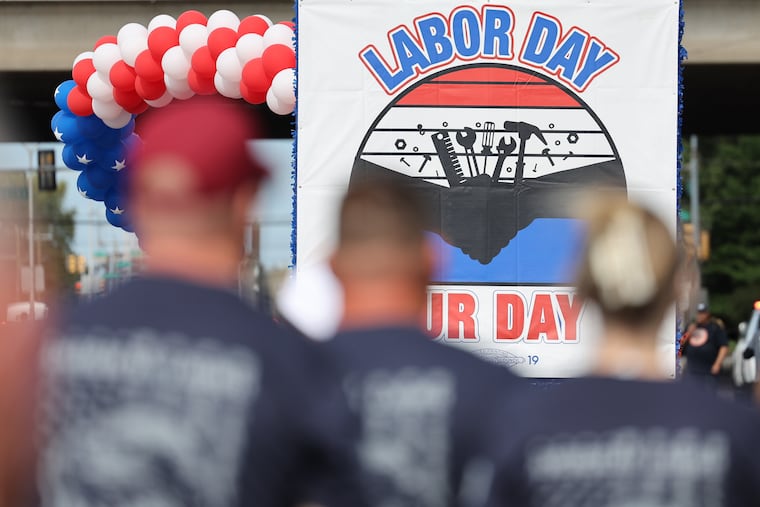Philadelphia workers shared a moment of levity on Monday — albeit fleeting.
While the fanfare of the Philadelphia Council AFL-CIO’s 38th annual Labor Day parade was a reprieve from what union leaders have described as unbridled attacks, the directive was clear:
Celebrate today, fight tomorrow.
“This really and truly is a special Labor Day for all of us,” said Lee Saunders, president of the American Federation of State, County and Municipal Employees, to a crowd of thousands lined up in a South Philly parking lot, “with elected officials who want to take our rights away from us, who want to take that seat at the table away from us.
“We can’t let that happen.”
The spirit of worker-centric festivities in South Philly were in harsh contrast to the state of the U.S. labor movement. Since taking office for his second term, President Donald Trump has stripped the rights of federal-worker unions and stunted the National Labor Relations Board by firing one member, leaving the board without a quorum to issue rulings.
Just before the holiday weekend, Trump signed an executive order commanding more government agencies — such as NASA, the National Weather Service, and the National Environmental Satellite, Data, and Information Service — to end collective-bargaining agreements with employees’ unions. (Meanwhile, in Washington, on the Department of Labor building, a three-story banner with Trump’s image and the slogan “American Workers First” has been draped since last week, with one of Theodore Roosevelt.)
In Pennsylvania, more than 2,600 federal government jobs have been axed and a recent report from the Keystone Research Center says federal policies have made things worse for the commonwealth’s workers.
» READ MORE: Pa. workers have lost leverage in Trump’s economy, report says
“Our response to any attack on us is simply, ‘Hell no,’” said Brian Renfroe, president of the National Association of Letter Carriers, rallying the already-rowdy crowd of teachers, tradespeople, and technicians.
“Whether it’s [this] administration, Congress, our bosses, or anyone else — when they attack us, they are met with a loud, intense, sustained, unified, ‘Hell, no,’” he said.
Tariffs and Trump’s immigration policies have also hit the nation’s labor force; the Associated Press reported that more than 1.2 million immigrants disappeared from the labor force from January through the end of July, per preliminary Census Bureau data analyzed by the Pew Research Center.
Earlene Bly, an organizer for hospitality and food service workers — an industry with an historically large immigrant employee population — said “no one is safe” under Trump. Bly said her union is trying to protect its foreign-born workers with specific contract language.
“I don’t care if you are a Democrat, Republican, liberal — whatever the case may be — we are all one democracy,” she said. “And if we actually want to survive this attack on democracy, we need to come together. We need to fight together in solidarity.”
Mayor Cherelle L. Parker, who attended the rally Monday morning but did not address the crowd, told a cluster of reporters, “We have to remember that all of our rights were fought for, and we have to make sure we continue advocating for them.”
Scattered throughout the parade, which wound through nearby neighborhoods, were a few, lonely protest signs: U.S. Mail not for sale, We The People reject kings and oligarchs, and Honk if Trump lies.
In more than thousand locales nationwide, including King of Prussia, Eagleville, and Ambler, “Workers Over Billionaires” demonstrations against big money-influence in politics were scheduled to take place Monday.
On a Christopher Columbus Boulevard median strip just outside the Sheet Metal Workers’ hall, where the parade began, Mark Tinkleman battled the wind as he held up a large, orange banner secured to PVC pipes. “Trump must go now,” the banner read.
Tinkleman, 38, and a handful of other organizers with Refuse Fascism, promoted a Nov. 5 protest in Washington to end “the Trump fascist regime.”
“There’s such an upheaval with the attacks on immigrants, with the attacks on education, the attacks on whole cities,” Tinkleman said.
He added: “We’re in a moment where unions are coming out — not just only standing up as righteously and graciously as they do for their own members — but recognizing that this is an existential moment and that we have to be explicitly political.”
Retired CWA member Jane Uptegrove’s message was one of defiance:
“Resist at every juncture, win the support of more Americans, fight ’em in court, fight ’em in the streets (and) get ready,” she said.
Other attendees, like AFL-CIO member Kevin Smith, used Monday to reflect on the labor movement’s wins, from the 40-hour workweek to the abolition of child labor.
Labor Day, Smith said, is “a day off that we well earned.”
